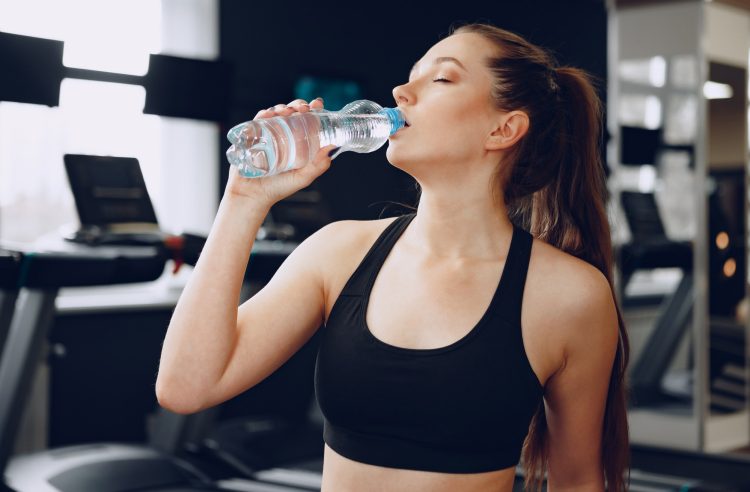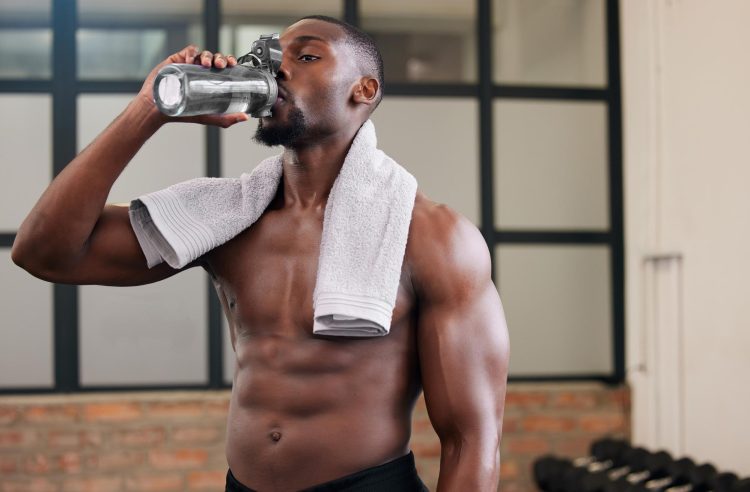Consuming over 48 ounces (six cups) of water each hour or three to four liters in a short period can lead to hyponatremia or water intoxication. Potential symptoms include headache, cramping, spasms, nausea, vomiting, drowsiness, or muscle weakness.
Drinking too much water can be dangerous (read: fatal). Overhydration occurs when you consume more water than your kidneys can excrete, and the salt concentration in the blood becomes too low, potentially leading to electrolyte imbalances. (1)
The human body is 70 percent water. Maintaining adequate water levels helps regulate body temperature, transport nutrients and oxygen, and lubricate joints.
You’ve probably heard you must drink at least a gallon of water daily to ensure optimal body functioning. However, as a personal trainer with over seven years of hands-on experience, I have seen that drinking too much water can start working against you.
In this article, we go over the importance of hydration for fitness, the risks associated with overhydration or water intoxication, and how to determine the right amount of water intake for yourself.
What is Water Intoxication?
So, you thought intoxication was only limited to alcohol? You’re about to have your mind blown.
Hyponatremia occurs when the sodium content in the blood drops too low. Sodium is an electrolyte that is vital for everything from muscle contractions to brain function. Think of it as your body’s electrical signals.
Here’s what happens when you drink an excessive amount of water:
- Electrolyte levels get diluted: Drinking too much water throws your electrolyte levels out of balance; sodium levels are the worst hit.
- Muscle cells start to swell: Your body likes to maintain an electrolyte balance. To restore the lost sodium levels, the cells draw in more water. While this is usually fine, it can become critical when brain cells start to absorb water and swell. The brain cells are crammed inside the skull and have no extra room, and swelling can be fatal.
Symptoms of Water Intoxication
The most common symptoms of drinking too much water in a short period include:
Mild Symptoms
- Nausea and vomiting
- Headaches
- Chronic fatigue
- Brain fog
Severe Symptoms
- Muscle weakness, spasms, or cramps
- Seizures
- Loss of consciousness
- Coma
You probably never thought that drinking too much water could lead to such detrimental health issues.
However, now that you know the side effects of hyponatremia, I highly recommend that you start monitoring your water intake more closely. I have my personal training clients log their water intake in a calorie-tracking app like MyFitnessPal.
Who is Most at Risk of Water Intoxication?
To be honest, drinking over a gallon of water in a short period or more than six cups of water each hour is easier said than done.
However, certain groups of people are at a higher risk of hyponatremia than others. These are the groups that should be extra careful about their water intake:
Endurance Athletes
Individuals who regularly participate in or train for endurance sports like marathons or cycling usually end up losing a lot of electrolytes through sweat. Drinking excess electrolyte supplements combined with a high water intake can be a dangerous mix. (2)
Drinking water at regular intervals is crucial to avoid dehydration. However, overdoing it can lead to severe health conditions.
Endurance athletes must closely monitor their water intake to prevent overcompensation and subsequent water intoxication. Athletes who feel dizzy or experience other health conditions after training should consult their healthcare provider.
People with Certain Health Conditions
The kidneys are responsible for filtering extra water from the blood and excreting it as urine. Similarly, if the heart isn’t pumping efficiently (congestive heart failure), excess water can accumulate in the body.
Kidney or heart issues can make it more challenging for your body to cope with excess water intake, making you more susceptible to fluid overload. Furthermore, certain medications, including diuretics, certain antidepressants, and pain relievers, can lead to water retention, increasing the risk of water intoxication.
Folks with pre-existing medical conditions must talk to a doctor about the best hydration plan for themselves.
Individuals with Mental Disorders
Some mental conditions like psychogenic polydipsia increase the urge to drink excessive amounts of water. This condition is usually seen in people with schizophrenia and other psychotic disorders and involves compulsive water drinking.
Psychogenic polydipsia is driven by a distorted thirst mechanism instead of actual physiological needs.
As mentioned above, drinking too much water in a short period can lead to dangerously low sodium levels and increase the risk of water intoxication.
If you or a loved one is experiencing mental issues, you should work with a mental healthcare professional, as they can help with appropriate strategies (including proper fluid intake) for maintaining a healthy water balance.
Water Drinking Contests
In the 21st century, there is a contest for nearly everything. We have hot dog eating, stinging nettle eating, pie eating, beer sculling, and water sculling contests. Each of these comps can lead to certain health complications.
Remember, what might seem like harmless fun can have dire health consequences. Learn about the ill effects of your favorite sport before going all-in on it.
Drinking vast amounts of water in short periods can lead to life-threatening electrolyte imbalance and rapid swelling of the brain. Some contests are not worth the risk.
How To Identify If You’re Drinking Too Much Water?
To verify whether you are at risk of water intoxication, you’ll need better cues than noticing if you’re feeling thirsty. On the other hand, waiting for hyponatremia symptoms might be a little too late.
Unusually clear urine, frequent bathroom trips, headaches, nausea, and a general sense of lethargy are a few signs that you’re at risk of hyponatremia. You might also experience mental fog and seizures in extreme cases.
How Much Water is Right for You?
Everyone from your training partner to your grandma has an opinion on how much water you should drink each day.
The truth is that there is no single right answer when it comes to how much water is too much for someone. Your water requirements depend on multiple factors, including:
Your Body
The ideal water intake will depend on your body composition. For instance, a 150-pound teenager will have a vastly different water intake goal than a 250-pound bodybuilder. Simply put, the bigger you are, the more water you need to function optimally.
Length and Intensity of Your Training Sessions
People who engage in a 15-30-minute living room bodyweight workout will need less water than an elite CrossFitter who trains for 1-2 hours each day with other athletes in a box.
Pro Tip: Weight yourself before and after a training session to determine how much water weight you lose on average after a workout.
Activity Levels
Those with physically demanding jobs will typically need more water than folks with desk jobs. The extent of your physical activity and the strain of your day play a major role in determining your ideal daily water intake.
Your Diet
Some food sources have more water content than others. Watermelon, strawberries, cucumbers, pineapples, peaches, oranges, bell peppers, and broccoli are rich in water. Consuming them throughout the day can lower the risk of dehydration.
Since the water content of these foods isn’t very high, there is very little probability of hyponatremia.
Conditions Where You Train
People training in high heat and humidity environments usually sweat more and need more water to rehydrate. Furthermore, if you are a naturally heavy sweater, you will need slightly more water than your peers to avoid dehydration.
Drink a Gallon of Water Daily — Myth or Truth?
You’ve probably been advised to drink 16 glasses (8 ounces) of water daily by your gym coach. Other water recommendations include drinking a minimum of eight glasses of water.
Truth be told, this is an oversimplification. Don’t get me wrong. These numbers are a good starting point. However, you must learn to listen to your body for signs of when you need to drink more water.
For instance, if you’re feeling full, there is no reason to chug another glass of water.
Develop the habit of checking your urine color every time you pee, as it is a surprisingly reliable hydration indicator. Aim for a pale yellow color. Darker shades usually mean you’re not drinking enough water. Conversely, a pure white color could indicate you are at risk of hyponatremia.
Get comfortable dismissing popular opinions to build a personalized health and fitness program.
The Dangers of Overhydration in Popular Trends
The “drink more water” trend is getting out of hand. Too many people these days are walking around with gallon water bottles. I hate to break it to you, but everyone doesn’t need to drink four liters of water daily.
Here are a few dangers of overhydration:
Water Intoxication
Why is it called ‘water intoxication,’ you ask?
It is because hyponatremia’s side effects include headaches, nausea, and confusion, which are also associated with alcohol intoxication. However, it doesn’t end here. Drinking too much water can also lead to seizures, coma, or worse.
Remember, your body needs the right amount of water, not necessarily the maximum amount.
The “Detox” Myth
People will tell you that drinking more water can help flush out toxins from your system. However, that is the liver and kidney’s job. Water to a level can help the process, but too much of it adds to the workload.
Overlooking Body’s Signals
Thirst is how your body tells you it needs some water. However, if you drink beyond that point and even when you’re hydrated and feeling full, you’re teaching your body to ignore its cues. Trust me, this never ends well.
Expert Opinion
Need a more detailed breakdown of when and how much water you should drink throughout the day?
I dove into research forums and social media platforms, looking for an answer.
Dr. Andrew Huberman (neuroscientist and an associate professor of neurobiology and ophthalmology at Stanford University School of Medicine) believes that you must consume a higher amount of water in the first 10 waking hours of the day. Here is the complete expert recommendation:
Across the literature the average suggestion of how much water to drink each day (independent of intake during exercise) is 8oz per waking hour for the first 10hrs of the day. Then 5oz/hr thereafter. Not necessarily on the hour but on average. In heat, obviously drink more.
— Andrew D. Huberman, Ph.D. (@hubermanlab) March 7, 2023
How To Stay Safely Hydrated
Staying hydrated sounds simple, but if it were the case, the “a gallon a day” movement wouldn’t have been such a hit.
Given below are a few tips to ensure optimal hydration levels:
Listen To Your Body Cues
When you are thirsty, drink some water. However, avoid the urge to chug huge amounts at once. Instead, take small sips until you’re satisfied. Remember, plain water is the best way of staying hydrated. Only add electrolyte supplements if absolutely necessary.
Eat Hydrating Foods
Some people don’t like drinking water throughout the day. Water-rich foods and veggies like watermelon, strawberries, cucumbers, and pineapples are a godsend for these folks. Eat small amounts of these foods as snacks to ensure optimal hydration.
Sweat Sessions & Electrolytes
If you are a heavy sweater and have been training hard in the gym, use electrolyte supplements to replenish your body’s lost minerals, such as sodium, potassium, and magnesium. Adding a pinch of salt to the water can also do the trick.
When To Talk To a Doctor?
The tips mentioned above will ensure hydration. However, here are some red flags you must watch out for:
- Constant thirst, even when drinking regularly
- Very dark, light, or infrequent urination
- Dizziness, confusion, or severe muscle cramps
If you experience these symptoms, consult your healthcare provider. Never ignore the underlying medical reasons for your hydration troubles.
Conclusion
Water is essential for life, but exceeding your body’s needs can lead to surprising health complications. Avoid drinking over 48 ounces (six cups) of water every hour to minimize the risk of water intoxication.
While a gallon of water each day is widely accepted as the most optimal amount of water intake, you must tune into your body to determine the right amount. Drink water when you are thirsty. Constantly monitor your urine color to ensure you’re optimally hydrated. A clear to pale yellow urine means you’re in the right zone.
If you have any questions about how much water is too much, drop them in the comments below and I’ll be happy to help!
References
Fitness Volt is committed to providing our readers with science-based information. We use only credible and peer-reviewed sources to support the information we share in our articles.
- Klingert M, Nikolaidis PT, Weiss K, Thuany M, Chlíbková D, Knechtle B. Exercise-Associated Hyponatremia in Marathon Runners. J Clin Med. 2022;11(22):6775. Published 2022 Nov 16. doi:10.3390/jcm11226775
- Johnson, K. B., Connolly, C. P., Cho, S. P., Miller, T. K., Sallis, R. E., & Hiller, W. D. B. (2023). Clinical presentation of exercise-associated hyponatremia in male and female IRONMAN® triathletes over three decades. Scandinavian journal of medicine & science in sports, 33(9), 1841–1849. https://doi.org/10.1111/sms.14401
Tip: If you're signed in to Google, tap Follow.












